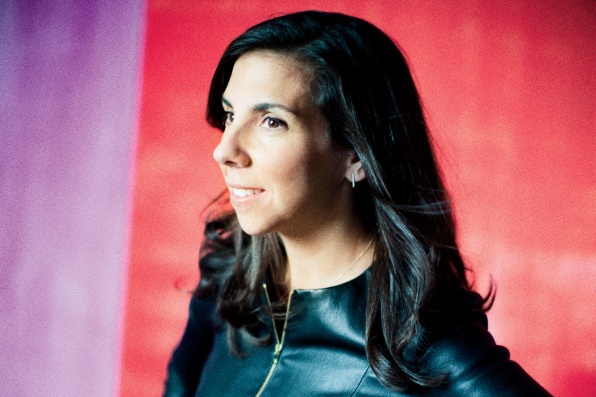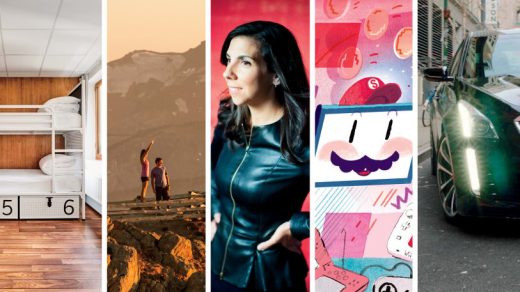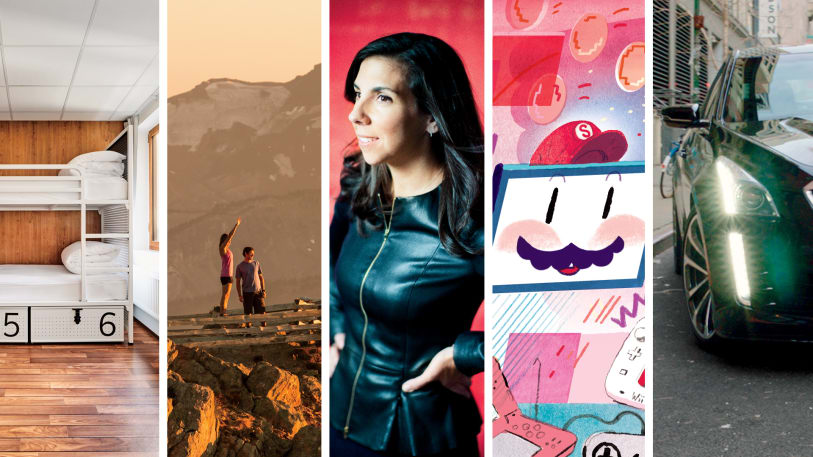SoulCycle’s Redesigned SoulBike Will Make Your Workouts Even Better
Every month, Fast Company checks in on the businesses in our Most Innovative Companies community. From SoulCycle’s new bicycle to Walmart’s acquisition of quirky e-tailer ModCloth, here’s what some of the most exciting companies have been working on lately.

SoulCycle
In April, SoulCycle, the chain of boutique fitness studios with 78 locations in 15 markets, launched its first-ever brand campaign, featuring a two-minute spot starring actual sweaty, attractive class instructors. As the music swells, they explain that SoulCycle–and its cult following–is not about the bike but rather about the rider. With the company expecting to add another 15 studios this year, the ads target both newbies and veteran cyclists in the company’s biggest markets (New York, Los Angeles, San Francisco), where there’s almost always a trendy new fitness option.
Despite the ad’s vociferous stance regarding soul versus cycle, the campaign debuted just a month before the company introduced a major redesign of its signature SoulBike. “Our riders are getting stronger, physically and mentally,” says CEO Melanie Whelan. “We want to continue to evolve the equipment and the workout for them.” In partnership with Colorado-based Stages Indoor Cycling, SoulCycle focused on making the bike more customizable, especially the handlebars, which had been thick and static. The new ones are thinner and can move forward and backward, which makes them easier to grip and adjustable for different body types and exercises. The bike’s new magnetic-resistance, carbon-fiber belt drive creates a smoother ride while requiring less testing, cutting 1,200 hours of weekly maintenance by a third. Meanwhile, small angle changes to the bars correct posture by adding wrist support. The new bikes rolled out in New York studios in May, with 6,000 bikes to be replaced this year. “We tested these at our New York headquarters,” Whelan says. “Even some of our master instructors were sore for days after.”
Milestones: SoulCycle just opened its first studio outside the U.S., in Toronto, with a Vancouver debut planned for the summer.
Challenges: Stationary bike maker Peloton has created an on-demand, at home spin experience to try to disrupt SoulCycle’s so far in-studio-only offerings.
Buzz: Positive

Nintendo
The hottest new consumer-electronics device of 2017 has been a system that combines the on-the-go nature of smartphone gaming with the power and detail of a home console. The Nintendo Switch, as it’s known, sold a reported 1.5 million units in the first two weeks of launch, making it the fastest-selling console in Nintendo history. As of the end of March, it has sold 2.74 million units globally.
Part of the Switch’s beauty is its simple design. Users can undock the central, 6.2-inch touch screen and attach the two controllers to either side for an experience akin to Nintendo’s handheld DS device. The other key component is the games themselves, particularly The Legend of Zelda: Breath of the Wild, which players have lauded as the best addition to the Zelda franchise in years because of its open-world, discovery-based format.
Nintendo needed to get the Switch right. Its most recent console, the Wii U, failed to establish value to customers over the original Wii and reportedly sold around 85 million fewer units than the company had anticipated. Amid criticism that Nintendo should move away from its console business and focus on opportunities such as its first major mobile game for Apple’s iOS, 2016’s Super Mario Run, and Pokémon Go, the Switch proves that for Nintendo, as with Apple, hardware and software go hand in hand. “If we were only a game developer, there’s no way we could have introduced Wii Sports, because there was no platform before Wii with motion control,” says Nintendo of America president and COO Reggie Fils-Aimé. “Game developers can’t take advantage of technology that doesn’t exist.”
Milestones: Nintendo unveiled plans to work with Universal on a theme park in Osaka, Japan, which will debut before the 2020 Tokyo Olympics.
Challenges: Xbox is expected to have a new console by the holidays, while Sony is still riding the success of its PlayStation 4 Pro.
Buzz: Positive

Vail Resorts
This spring, Vail Resorts, one of the largest ski-area operators in the world, extended its colossal reach with its first East Coast acquisition, Vermont’s Stowe Mountain. The timing of the buy wasn’t accidental. Late spring and summer, when skiing and snowboarding drop off, are actually Vail’s most important time of the year, because this is the moment when it starts to market next season’s Epic Pass, which offers unlimited access to 45 ski areas around the world. Over the past few years, Vail has used the off-season to beef up the $859 Epic Pass, by acquiring Canada’s Whistler Blackcomb in 2016 and Australia’s Perisher Mountain in 2015. The Stowe purchase allows Vail, which is concentrated in the western half of the U.S., to make a compelling bid for the skiing set in New York and Boston, offering access to a coveted weekend spot as well as its destination locations in Colorado and Utah.
Each Epic Pass sold brings both revenue–sales now make up 40% of lift income–and data on Vail’s active skiers. The most important information is where they come from and how long they stay. Visitors who ski four or more days are likelier to buy an Epic Pass, while information on skiers’ home bases has determined Vail’s recent strategy of acquiring small mountains outside major cities such as Detroit, Minneapolis, and Chicago. “There are more skiers in Chicago than the entire state of Colorado,” says CMO Kirsten Lynch. “The whole concept of, Oh, a season pass is for locals. . . . We’ve completely shattered that myth.”
Milestones: Annual Epic Pass growth is an impressive 16%, and the company expects to sell 650,000 Epic Passes for the 2017-2018 season.
Challenges: If climate change starts to shorten the ski season, it will put more pressure on Vail to make its resorts off-season destinations as well.
Buzz: Positive
Spotify
Milestones: In a move that could smooth the way for an IPO, the music-streaming giant struck a licensing deal with Universal Music Group that will allow UMG artists to restrict new albums to paid Spotify subscribers for up to two weeks post-release, making Spotify more attractive to premium artists such as Taylor Swift, whose label Big Machine is distributed by UMG. Similar major-label deals are likely to follow.
Challenges: Spotify still needs to prove that it can be a profitable streaming service, which means continuing to convert free users into paid subscribers.
Buzz: Positive
Samsung
Milestones: The new Galaxy S8 smartphone earned widespread praise for its nearly bezel-less design, which gives it one of the highest screen-to-body ratios on the market.
Challenges: Samsung is still mired in a corruption scandal involving top executives, like company chief Lee Jae-yong, who was indicted in February.
Buzz: Neutral
eBay
Milestones: By summer, eBay will guarantee delivery within three days for more than 20 million eligible items that are for sale on its site. Many of these items will also come with free shipping.
Challenges: eBay is playing catch-up with Amazon and Walmart, and it’s still struggling to customize its experience for individual users.
Buzz: Negative
Yelp
Milestones: Yelp‘s Grubhub competitor Yelp Eat24 has started testing self-driving robot delivery carts in San Francisco in partnership with robotics company Marble. Diners unlock their meals inside the automaton via a pass code Yelp texts them upon delivery.
Challenges: Facebook is coming for Yelp again, both as a listings destination and a food-delivery service by integrating smaller partners such as Slice and Delivery.com into its pages.
Buzz: Neutral
General Motors
Milestones: General Motors is testing a new subscription car business called Book by Cadillac, which lets customers willing to spend $1,500 a month serially swap out one Caddy for another. The new model is part of GM’s plan to target places with falling car ownership, like New York, where the plan debuted.
Challenges: GM has been riding the national post-recession wave of high automobile sales, especially with the popularity of SUVs and trucks as gas prices remain low. But with car sales starting to slip, it will need to keep coming up with ways to optimize resources (like its recent divestment of Europe’s Opel brand) to fund its investment in future technologies.
Buzz: Neutral
Cisco
Milestones: In March, Cisco completed its $3.7 billion acquisition of AppDynamics, a software startup that monitors app performance. The deal gives Cisco a lot of fresh data to work with, which will be especially important as it builds out its cloud business.
Challenges: Cisco’s legacy network-equipment business is under threat from cloud-computing giants like Amazon, Google, and Oracle.
Buzz: Neutral
Macy’s
Milestones: Amid the closing of 100 U.S. stores, Macy’s is pinning its hopes on outlet sales. Backstage, its discount store within its stores, is opening 30 new locations this year, including its first in the Southeast.
Challenges: The shop-within-a-shop model is part of Macy’s effort to make in-store visits more worthwhile. Apple and Sunglass Hut installations inside Macy’s have been a win, but Men’s Wearhouse tuxedo shops floundered.
Buzz: Negative
Aldi Süd
Milestones: Bargain grocery store Aldi is making its first leap into China through e-commerce. It is using Alibaba’s Tmall platform to sell things like breakfast foods, snacks, and wines.
Challenges: Aldi’s revolutionary cost cutting has forced major grocery stores to chase it, which in turn pushes Aldi to lower prices further, squeezing its margins even more.
Buzz: Positive
Intel
Milestones: The chip-maker acquired Mobileye, the Israel-based company that creates cameras and sensors for autonomous vehicles, to increase its presence in the self-driving-car race.
Challenges: Intel has a mediocre track record when it comes to integrating big acquisitions, such as 2010’s failure to incorporate McAfee’s security tech into Intel products. With Mobileye, $15 billion and entrée into one of tech’s next big platforms ride on making it work.
Buzz: Neutral

Generator Hostels
Milestones: The design- and experience-focused hostel chain has been acquired by the private-equity firm Queensgate Investments, which plans to infuse more than $320 million into Generator as part of a future major European expansion.
Challenges: Hotel companies have noted the success of Generator and are now launching their own stylish hostel brands, including AccorHotels’ new Jo&Joe.
Buzz: Positive
ModCloth
Milestones: Quirky, vintage-style online fashion retailer ModCloth has been acquired by Jet.com, which itself is owned by Walmart. The buy is a continuation of Walmart’s strategy of marketing toward younger customers, particularly online.
Challenges: ModCloth’s heyday was a few years ago. The company has since struggled with layoffs while being eclipsed by newer options.
Buzz: Negative
Baidu
Milestones: Beijing-based search giant Baidu is doubling its Silicon Valley presence, via a new research and development facility that has room for 150 more employees, in the hopes of improving its artificial-intelligence acumen.
Challenges: Baidu’s revenue growth has plummeted from 35% in 2015 to 6.3% in 2016, as Chinese advertisers migrate dollars away from search engines and toward things like e-commerce and social media.
Buzz: Neutral
Microsoft
Milestones: Skype Lite, a version of the video-messaging service tailored to lower-speed, 2G networks common across India, came out this year. Microsoft is also working with LinkedIn on Project Sangam, a cloud service for job seekers in the world’s second-most populous country.
Challenges: Microsoft needs to keep attracting more developers to Azure, its cloud-computing platform, as evidenced by its acquisition of Deis in April, a small open-source tool that helps developers work efficiently with apps across the cloud and physical machines.
Buzz: Positive
Plus, a look into Nintendo’s new Switch gaming system and more from our Most Innovative Companies alumni.
Every month, Fast Company checks in on the businesses in our Most Innovative Companies community. From SoulCycle’s new bicycle to Walmart’s acquisition of quirky e-tailer ModCloth, here’s what some of the most exciting companies have been working on lately.
Fast Company , Read Full Story
(41)














